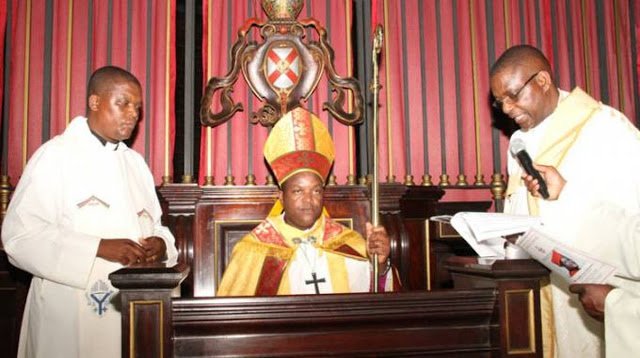 |
| Arch Bishop Mutamiri of Harare |
Upenyu
Chaota
The Anglican Council of
Zimbabwe (ACZ) has sprung to the defence of the Zimbabwe Catholic Bishops
Conference (ZCBC) saying government could not continue pretending that
everything was alright when the country was in a crisis.
This is contained in a
letter dated August 24, 2020 and signed by Ignatios Makumbe the Anglican Church
in Zimbabwe chairperson (Diocese of Central Zimbabwe), Godfrey Tawonezvi
(Diocese of Masvingo), Cleophas Lunga (Diocese of Matebeleland), Erick Ruwona
(Diocese of Manicaland) and Farai Mutamiri (Diocese of Harare).
In the letter, the
Anglicans urge the government to address the issues raised by the catholic
bishops instead of attacking them.
Riding on the Bible
book of Ezekiel 3:7 which reads, “Son of man, I have made you the watchman to
the house of Israel; therefore, hear the word at my mouth and give them warning
from me”, ACZ says that as a church could not ignore the torment that the
people were being subjected.
“The Anglican Council
of Zimbabwe (ACZ) writes in solidarity with the pastoral letter issued on 14
August 2020 by the Catholic Bishops Conference entitled “The March is Not
Ended”.
“ACZ notes with concern
the several responses by the government of Zimbabwe to the Catholic Bishops
Conference which seems to dismiss the fact that the church is called to
exercise its prophetic role, which can mean challenging our political leaders
on their conduct of affairs, particularly if this affects the people of God.
“We write this message
to highlight our concerns and emphasis that ‘Indeed the March has not ended’
unless and until the issues raised by the people of Zimbabwe and also echoed by
the bishops are attended to and resolved holistically,” reads the letter.
ACZ says that the
government has decided to take a defensive position and attack the church
instead of interrogating and addressing the issues and concerns raised by the
church on behalf of the people.
“We wish to register
our concerns to the several responses of the government which we feel were
counterproductive to the efforts being made by many stakeholders including the
church to unite the nation.
“We make it abundantly
clear that since time immemorial, the church in Zimbabwe has spoken against
injustice and has been consistent in that regard. Any view or postulation to
the contrary would be an attempt to rewrite that narrative in order to promote
a negative picture of what the church stands for.
“The church has the
biblical mandate to speak without fear or favour, particularly to a government
which believes that ‘The voice of the people is the voice of God’. The
prophetic ministry of the church mandates it to speak for God and for his
people as it is the ambassador of Christ and God in appealing through it (2
Cor.5:20).
“As Anglican bishops,
we desire to see an engagement of all stakeholders as respected by the Zimbabwe
Heads of Christian Denominations (ZHOCD) and respect of the constitution of the
land and institutions thereof for the good of the nation and (Proverbs 11:14)
victory for the nation as we, together, overcome all our challenges,” reads the
letter.
The Anglican Church
called on all progressive religious leaders and religions to pray for peace in
the country as the situation has reached a tipping point.
“We also call upon the
citizens of this our beautiful nation to remain calm, pray for peace and to
work towards all that promotes peace and the common good.
“We also call upon all
Christians and other religions to pray for our leaders and the nation at large
for peace, stability and prosperity.
“To our brothers and
Roman Catholic in particular, we say we are holding you in our prayers and may
the blessing of the Almighty God strengthen you and be with you now and
forever,” reads the letter.
After ZCBC wrote the
pastoral letter, the government raged and attacked them bishops as evil, but
several other faith and non-faith organisations published statements in support
of the bishops.
During a recent Zanu PF
politburo meeting, President Emmerson Mnangagwa challenged churches that were
critical of his rule to form their own political parties and contest in
elections.
